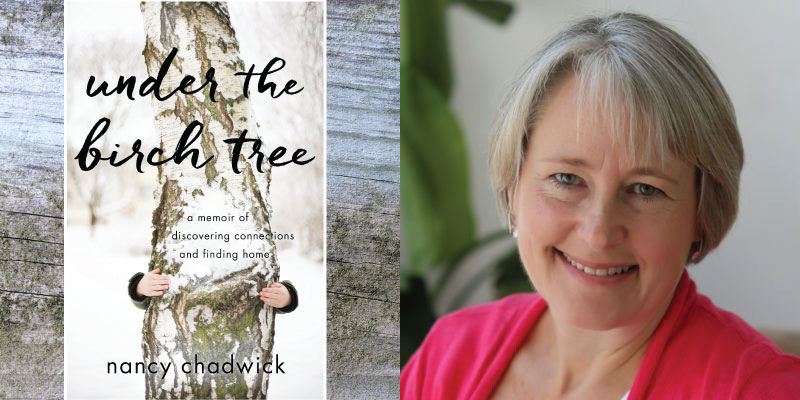I had the pleasure of reading Under the Birch Tree to review for San Francisco Book Review. I hope you enjoyed providing your insights and experiences with us.
What first inspired you to write your story?
There was something about trees. When I was a young girl, maybe eight or ten, I was a walker who enjoyed the outdoors, just roaming around and exploring. I liked to walk around the perimeter of my house, starting and ending at the front where my favorite tree, a birch, grew. I loved that tree, especially because of how it looked with its peeling white bark and wavy slender leaves. It always reminded me of home; they were one and the same. I felt strongly about establishing one’s roots and a sense of belonging and home that my early steps around the foundation of my home became an idea worth developing.
Under the Birch Tree is all about discovering connections and finding home; tell us how and why the family homes birch tree became a main source of connection and companionship for you?
I connected to this tree for a couple of reasons. First, I connected to it because of its very nature. The birch tree is associated with spring and new beginnings and appears light and clear and flexible and can also be reactive to external situations – water, light, temperature. That is why my birch buddy is woven throughout my story. It became a metaphor for my self-discovery for finding home. When I would spot a tree, instant memories put me back to a place I associated with comfort, security and the familiar.
How did you find the writing process for Under the Birch Tree? Did it come easily? Did you find it evoked any unwanted emotions?
I wrote the first draft over ten years ago and it consisted of memories of experiences. Writing the events was the easy part. The more difficult part was figuring out why I remembered what I did and what sense it made. The process was emotional and, wanted or not, it was important that all my emotions played out. My emotions were my voice.
You started the writing process for Under the Birch Tree some time ago, what motivated you to publish it now? And how did you decide on the title?
My goal was to not publish a book, but rather was, and still is, an intent to connect, in the large and small sense of the word, not only with myself but also with others who could identify with similar experiences. I held back in believing in my story because of the types of memoirs I saw published, something my memoir was not. I was looking for complicated significance to my story when really it was quite simple. That was my go-ahead, my motivation, when I realized story-telling didn’t have to be complicated, but could be simple too. I decided on the title, an easy decision, because what happened under the birch tree was such a loud and clear metaphor for the disconnections I faced in my life and losing my sense of place and belonging.
How did you turn your book around from almost being an autobiography to becoming a memoir? What tips can you give other writer’s facing a similar obstacle.
I had to focus threading my central theme consistently throughout, having a clear voice, and writing good descriptive scenes and dialogue where appropriate. My inner dialogue spoken through with reflection was also key to being authentic to my readers. My best tip for other writers would be that it’s okay for a writer to start with autobiography, to write all those things that is remembered but steps must be taken beyond that to rewrite and rewrite until a theme becomes clear and then reflections can be recorded.
You started your career completing a degree in Journalism, was it always an ambition of yours to become a writer?
No, my ambition wasn’t to become a writer. I wanted to be in advertising, to write mini-stories to sell products, and my studies in that field were in the College of Journalism.
What sort of editorial changes, if any, did the manuscript need to go through?
The manuscript went through a few editorial changes, the most common was about sequence of events and timing. I tended to move around in time, without explaining how I got to each place. I also needed to clear some contradictions (all part of finding the reflections!), and fill in gaps of badly needed inner dialogue.
How have you found the publishing process to be? Did you approach the publisher and what made you choose them?
I contacted Brooke Warner (at Warner Coaching) about four years ago with the request for a professional critique of the manuscript. As per her suggestions and comments, I rewrote the manuscript, working with a developmental editor, who asked if I was going to publish with She Writes Press. The question surprised me as I was sure the manuscript would always need work and wasn’t quite ready to be published. Brooke Warner is She Writes Press so one thing led to another, rather quickly, and the rest, as they say, was history!
Can you see yourself writing another book in the near future, and if so, what genre would it be and why?
I am already starting on my second book. It will be another memoir with further developing themes with more inspirational insight and picking up from where I left off from book one. Book one has many legs and I’d like to take a couple of them and run with it!
Finally, what advice would you give to anyone already working on, or thinking about writing their memoir?
Memoirs get such a bad rap sometimes. Memoirs can be pigeonholed into what they are and/or are not so much so that this can be discouraging for a writer to let it all out, questioning if they, indeed, have a memoir. There’s no right or wrong. I happen to have a quiet memoir, untraditional to the traditional single-incident story of something horribly tragic, abuse of some kind, a health issue, death, to name just a few. I write about my experiences that most can identify with and because of this, I hope my reader can see her own self-discovery through the narration of my own. Lastly, I tell to-be memoirists to just write. Get your thoughts and feelings and emotions down into words. Write as if you are talking to your best friend, your confidant. It’s not as a daunting task as you would think.
Thank you for the opportunity to read Under the Birch Tree, which has been a joy and one in which I have been able to find a real personal connection with. I wish you every success with your upcoming publication.

NANCY CHADWICK got her first job at Leo Burnett advertising agency in Chicago. After ten years there, she couldn’t get to where she wanted to be so she turned to the banking industry. Then, after another ten years, she realized she wasn’t a banker―so she quit and started to write, finding inspiration from her years in Chicago and San Francisco. Her essay “I Called You a Memoir” appears in The Magic of Memoir, an anthology published by She Writes Press. She and her husband enjoy traveling, cooking fine dinners, and chasing their beagles in circles.
Connect with Nancy:
Website | Pinterest | LinkedIn

